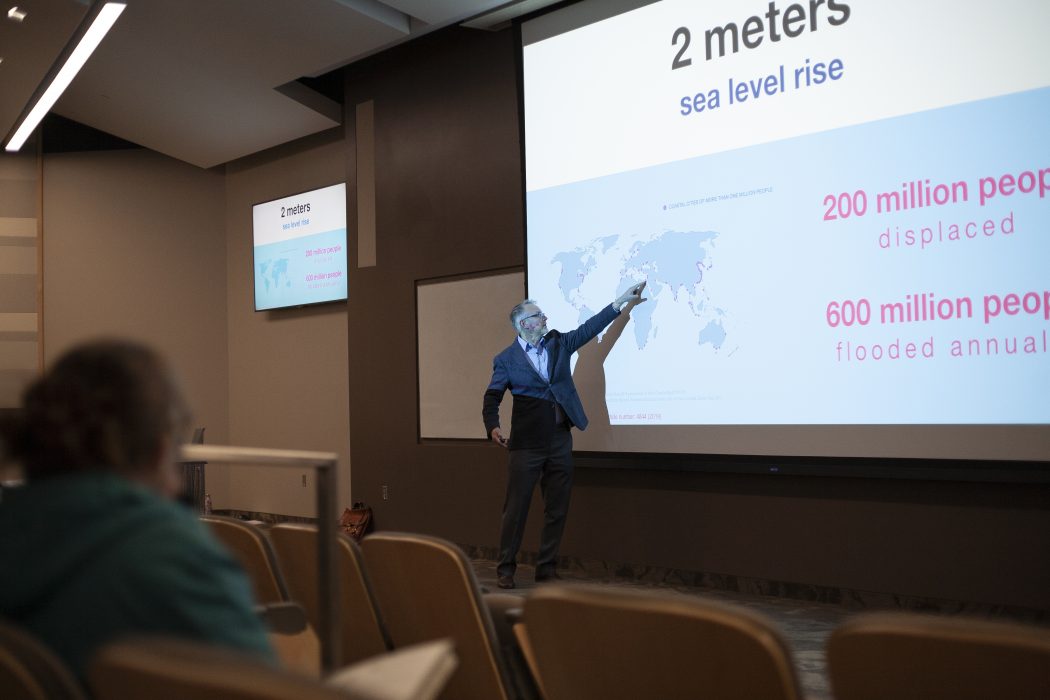USU professors speak on urgency to address climate change
On Thursday, Jan. 30, Rob Davies and Patrick Belmont spoke to students and faculty in the Life Sciences building about the urgency of climate change and explained what Utah State University is doing to reduce its impact.
Davies focused on the gravity and emergency of climate change. “What I found is that we are in a great state of disruption,” Davies said. Davies is a professor of physics at USU who focuses on atmospheric science, climate science and critical science communication.
“Over the last century, the earth has warmed a little over one degree Celsius, and most of that has come in the last 40 years,” he said.
Davies explained this seemingly small degree of temperature change has a huge impact on the planet. “In the Earth’s system, everything is connected,” Davies said. “So if you change the temperature, you change everything else.”
According to Davies, scientists have already noticed shifts in the current state of our planet. “In the last four decades, we have wiped out 60% of the world’s living creatures,” he said. “We are losing species at a rate of dozens per day. Through massive extractions and pollution, we are destroying habitats. This is a massive assault on the biosphere that supports us.”
Davies said preserving our environment will become more difficult the longer people wait to make changes. “If we had started acting 30 years ago when we absolutely, unequivocally knew that we needed to do this, it would have been almost trivial,” he said. “But we have waited so long now that every additional year we wait, it gets dramatically harder.”
Davies explained that throughout the world, 10% of the world’s population is responsible for over half of material and energy consumption, and there are things individuals in the top consuming countries can do to reduce their impact.
“Everyone in this room can reduce their emissions 15%,” Davies said. “Where do we produce the most emissions? What we eat and how we move ourselves around. Overwhelmingly, industrial, animal agriculture is responsible for roughly 30% of the world’s emissions. Can you eat 15% less meat? Can you drive 15% less? Can you fly 15% less?”
Davies also said the single biggest thing people can do immediately is talk about climate change with friends, families, neighbors, political leaders and colleagues.
“It’s not about hope,” Davies said. “It’s about resolve. If we want hope, act. We don’t solve problems of this scale until we commit to them.”
Belmont followed Davies and focused on what USU is doing to combat climate change.
According to the USU Greenhouse Gas Reduction Steering Committee, in 2007, USU committed to becoming carbon neutral by 2050.
Since then, the steering committee has worked hard to reach that goal. In December 2019, the committee released the Greenhouse Gas Emissions Reduction Draft Plan, which received feedback and, according to the Student Sustainability Office, was submitted last month.
Belmont helped form the steering committee, and he is the president of the Faculty Senate. He explained that USU has flatlined in carbon emissions, and a flatline is not good enough. Belmont said, “The simplest, easiest thing USU can do to get a big drop in emissions is to purchase a renewable energy portfolio.”
According to Belmont, the Facilities department is putting in half a million dollars every year for the next ten years to improve energy efficiency throughout campus. “It’s not flashy,” Belmont says. “It’s essential, and it’s going to make a big difference.”
Belmont said Charles Darnell, head of USU Facilities, has been proactive in working with Rocky Mountain Power to have more renewable power sources on the grid that the university can purchase. USU also has converted the library to 85% LED lights, which saves the university $5,000 to $6,000 a month in energy costs.
Jacob Alder, a student at USU who attended the seminar, said, “We have a serious problem, and we don’t have enough movement. We need more people to know what is going on.”
“The problems we are facing are overwhelming for sure, but the call to action is more powerful,” Sam Fitch, the farm manager of the UCC Urban Community Farm in Cache Valley, said. “We need to get real and get to work. There isn’t time to be hesitant.”


Overwhelmingly, industrial, animal agriculture is responsible for FEEDING PEOPLE.